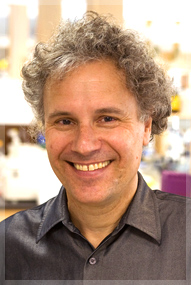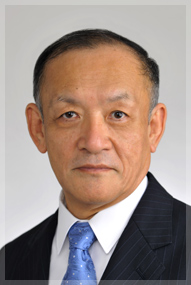The 2013 Keio Medical Science Prize Awardees
Victor R. Ambros, Ph.D.

Silverman Professor of Natural Science
Program in Molecular Medicine
University of Massachusetts Medical School
Reason for Selection
Discovery of microRNAs as a new class of gene regulators
Dr. Victor R. Ambros first discovered microRNAs (miRNAs) in 1993 using molecular genetics of C. elegans. His group cloned the lin-4 gene which affects the timing of developmental events by negatively regulating the LIN-14 protein levels. Surprisingly, the lin-4 gene product turned out not to be a protein but rather a small 22-nucleotide RNA containing sequences complementary to the 3'UTR of lin-14 mRNA, suggesting that lin-4 regulates lin-14 translation via a direct RNA-RNA interaction. Thousands of miRNAs have recently been found in many eukaryotes including humans, and miRNAs are shown to be linked to many diseases, including cancer and neurological diseases. The application of miRNAs to target disease genes and the technology to block action of miRNAs are emerging as new therapeutic approaches. Ambros' discovery of miRNA has thus overturned the traditional paradigms of the regulation of gene expression and opened up an exciting new field of research.
Background
<Professional Experience>
- 1975-1976
- Research Assistant, M.I.T. Center for Cancer Research. Supervisor: David Baltimore.
- 1976-1979
- Graduate Research Assistant. Supervisor: David Baltimore
Postdoctoral Fellow, M.I.T. Supervisor: H. Robert Horvitz - 1985-1988
- Assistant Professor,
Department of Cellular and Developmental Biology, Harvard University - 1988-1992
- Associate Professor,
Department of Cellular and Developmental Biology,
Harvard University - 1992-1996
- Associate Professor, Biological Sciences, Dartmouth College
- 1996-2001
- Professor, Department of Biological Sciences,
Dartmouth College - 2001-2007
- Professor of Genetics, Dartmouth Medical School
- 2008-present
- Professor, Program in Molecular Medicine, University of
Massachusetts Medical School
<Major Honors and Awards>
- 2005
- Lewis S. Rosenstiel Award (shared), Brandeis University
- 2008
- Lasker Award (shared)
- 2008
- Gairdner Foundation International Award
- 2009
- Dickson Prize, University of Pittsburgh
- 2012
- Dr. Paul Janssen Award for Biomedical Research (shared)
Shigekazu Nagata, Ph.D.

Professor, Department of Medical Chemistry
Graduate School of Medicine, Kyoto University
Reason for Selection
Molecular mechanisms of apoptosis and its physiology
Aged or abnormal cells are eliminated by the process of programmed cell death, named apoptosis. Apoptotic cells are engulfed by macrophages. Dr. Shigekazu Nagata first elucidated the molecular mechanism of a series of apoptotic reactions, and discovered the physiological significance of each process. He characterized the Fas-Fas ligand system and identified the DNA degradation enzymes that are involved in DNA fragmentation in apoptotic cells. He also showed that abnormality in those processes caused autoimmune diseases. More recently, he identified the molecules necessary for the recognition of apoptotic cells by macrophages, in which phosphatidylserine on the cell surface of apoptotic cells plays an important role. Notably, his group discovered the long-searched enzyme called scramblase, which is essential to expose phosphatidylserine on the cell surface. Dr. Shigekazu Nagata's continuous great contribution to the field of apoptosis well deserves the Keio Medical Science prize.
Background
<Education>
- 1968- 1972
- Undergraduate in the Faculty of Science, University of Tokyo
- 1972- 1977
- Graduate Student in the Institute of Medical Science, University of Tokyo
<Research and professional experience>
- 11977- 1981
- Post-Doctoral Fellow, Institute of Molecular Biology, University of Zurich
- 1982- 1987
- Assistant Professor, Institute of Medical Science, University of Tokyo
- 1987- 1998
- Head, Department of Molecular Biology, Osaka Bioscience Institute
- 1995- 2007
- Professor, Department of Genetics, Osaka University Graduate School of Medicine
- 2002- 2007
- Professor, Integrated Biology Laboratories, Graduate School of Frontier Biosciences, Osaka University
- 2007-present
- Professor, Department of Medical Chemistry Graduate School of Medicine, Kyoto University
<Major Honors and Awards>
- 1994
- Emil Adolf von Behring Prize, Philipps-Universitat Marburg
(Germany) - 1995
- Robert Koch Award, Koch Foundation (Germany)
- 1997
- Le Prix Antoine Lacassagne, French Cancer League (France)
- 2001
- Person of Cultural Merit, Japanese Government (Japan)
- 2012
- Debrecen Award, Debrecen University (Hungary)
